WHAT CAUSES ATOPIC DERMATITIS
While the visible symptoms of atopic dermatitis may look different for everyone, they all may be coming from an inflammation underneath the skin. Find out what may cause atopic dermatitis, and what could really be going on under your skin.
Understanding the Causes
Eczema that occurs chronically may be more than just a skin condition. It could be a disease called atopic dermatitis.
The most common type of eczema is atopic dermatitis, a chronic disease. If you struggle with frequent flare-ups that just keep coming back, there may be a bigger story happening inside your body.
With atopic dermatitis, even when your skin looks clear, the inflammation may still be active under the surface, and your next flare-up is just waiting to return. Some people always show signs of the disease.
The most obvious sign of atopic dermatitis is dry, itchy skin. Flare-ups are different for every person and can appear all over the body.
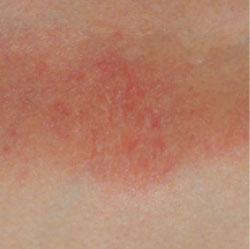

Redness
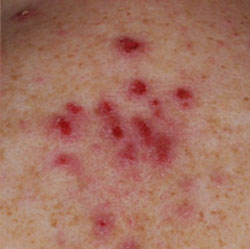

Oozing
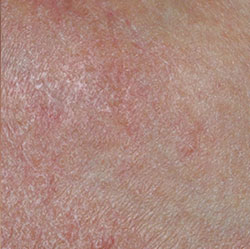

Scaling
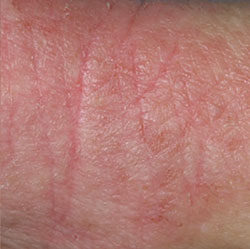

Swelling
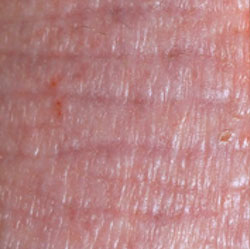

Thick Skin
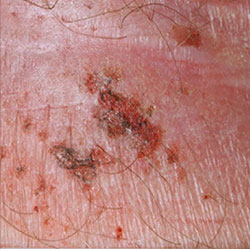

Crusting
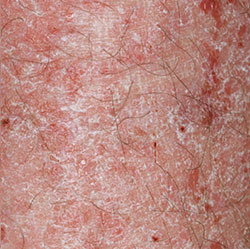

Dryness
But the rashes on the surface are only part of the story. The impact can go deeper than the skin. In fact, the majority of people with moderate-to-severe atopic dermatitis report that itch can delay falling asleep and occasionally or frequently wakes them up at night. To really understand atopic dermatitis, you have to look at the deeper cause within your body.
Common Thoughts
These are a few common thoughts among people with atopic dermatitis. Do these sound familiar?

"I only need to treat my atopic dermatitis when I've got a rash."
Because your itch and rash may come and go, it can seem like your atopic dermatitis does too. But even when you can't see it, atopic dermatitis is still there. And if you treat only your symptoms, you're never reaching the cause of the disease, an overactive immune system.

"As long as I avoid things like perfumes or scented soaps, I’ll be fine."
Your atopic dermatitis is an immunological disease caused by an overreaction of your body's natural defense system. The inflammation inside your body leads to a flare-up. Understanding what may trigger a flare-up and avoiding those triggers are good strategies for managing your symptoms, but atopic dermatitis is more than just what you can see on your skin.

"If I just leave it alone, eventually it will go away."
Atopic dermatitis is more than just a skin condition. It's an immunological disease. Your body’s immune system is overreacting, and the chemicals your body uses to defend itself are actually causing the problem.
Even when your skin is clear, the disease is still present. Topical treatments may not do enough to treat atopic dermatitis, and it is unlikely to just go away on its own. Talking with your healthcare provider about what is going on under the surface may help you find ways to manage your atopic dermatitis and better cope with the symptoms.
Understand how Atopic Dermatitis impacts your life with our simple
10 seconds skin assessment.
Use the self-assessments to help you and your doctor identify specific concerns about your atopic dermatitis treatment and management.
Scratching the Surface
Atopic dermatitis is an immunological disease, which means it involves the immune system.
With atopic dermatitis, your immune system is highly sensitive and can react to even the smallest allergens or irritants. This reaction can cause excess inflammation underneath your skin, which may lead to your frequent flare-ups. So those rashes you see on the surface are just the visible signs of a deeper inflammatory disease.
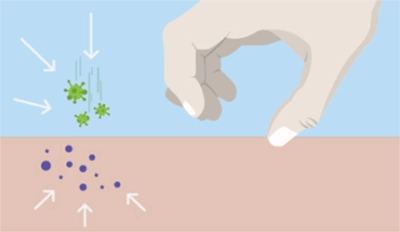
1. ITCH
In people with atopic dermatitis, immune cells in the deeper layers of your skin send inflammatory signals to the surface, causing the itchy rash you’re all too familiar with.


2. SCRATCH
When you scratch, you can break down the outer layer of skin, which allows germs, viruses and allergens to get in.


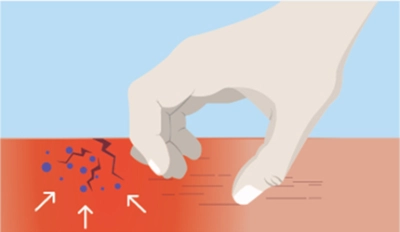
4. RELEASE OF INFLAMMATORY SIGNALS
The more you scratch, the more your skin barrier breaks down, and the itch-scratch cycle continues.

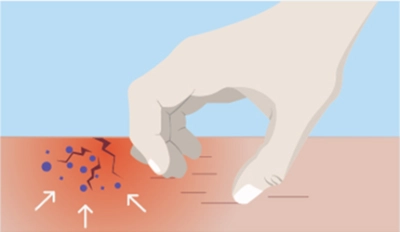
3. DAMAGED SKIN
In response to these invaders, your immune system continues to send signals to the surface, causing even more redness and itching.
Health information contained herein is provided for general educational purposes only. Your healthcare professional is the single best source of information regarding your health. Please consult your healthcare professional if you have any questions about your health or treatment.
MAT-SG-2500068-v1.0-04/2025

